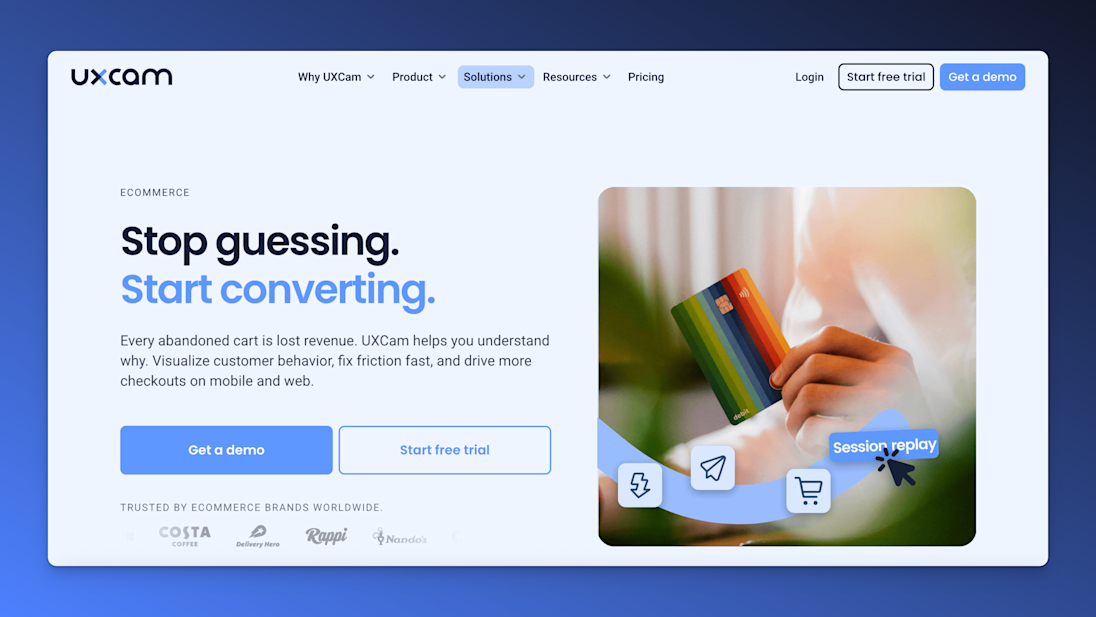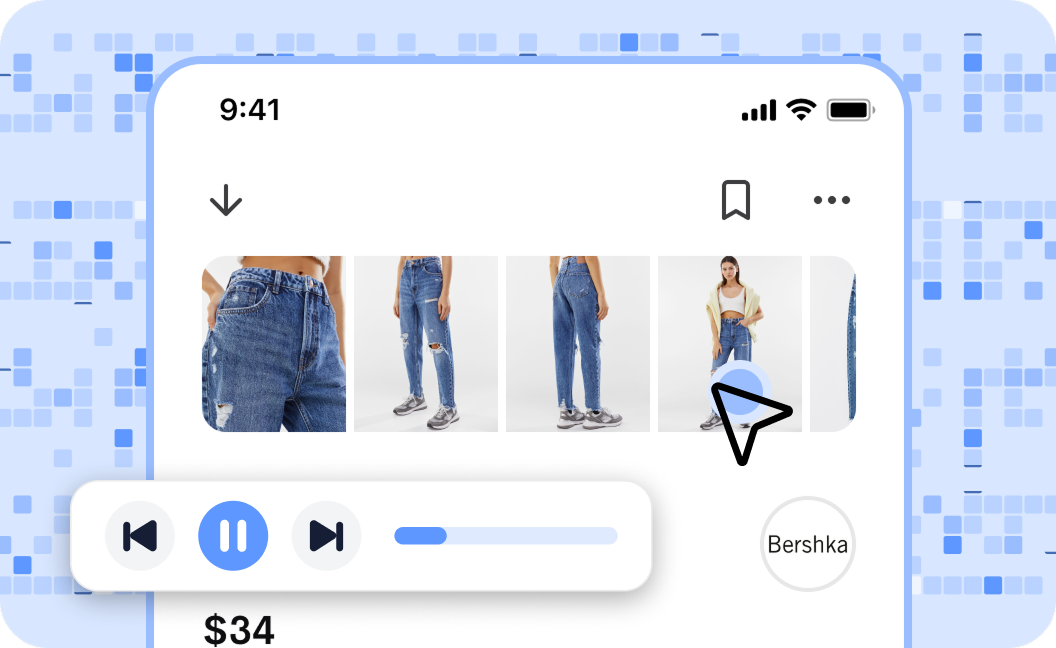Back to blog
5 MIN READ
Mobile App Growth Strategy - How to Increase App User Base
PUBLISHED
2 November, 2023

Product Analytics Expert
Having a large, active user base can trigger all kinds of acquisition snowballs—from exponential word-of-mouth growth to algorithmic recommendations to widespread media attention.
But… how do increase your app’s user base to a point where these effects can start to take off?
In this UXCam guide, we answer that question with seven actionable tips you can implement to increase your user base. These tips span multiple disciplines, from product design to marketing and customer service, so there’s bound to be one that applies to you.
Let’s get started.
What does user base mean?
User base is a term used to refer to the people who use your product as a collective. It’s essentially another way of saying users, active users, or customers.
We’ll go more in-depth into the importance of measuring and increasing your user base later in this guide. For now, it’s enough to know that the more people you have using your product, the larger the impact it will have on your bottom line.
Why is growing your user base important?
Reducing acquisition costs
Acquisition costs (usually) follow a predictable curve. In the early stages of growth, costs are high—you’re doing all the work yourself, no one knows about your product, and you don’t have a clear picture of whom you’re targeting.
All of these costs (and many more we haven’t listed) start to decrease as you reach a larger user base. The snowball effect is real—the more people who know about your product, the easier it is to continue growing.
Increasing revenue and profitability
This is a simple one—a larger user base means more opportunities for monetization. If you have a fairly stable revenue-per-user rate from your current user base, then user growth can significantly increase your bottom line.
That gives you wiggle room to further grow your product through new features, marketing, and more.
Understanding your users
A small user base is a limited sample size—it’s hard to draw any meaningful conclusions from a few hundred or thousand users. With more people using your product, you’ll get better insights into who is using it and why.
That leads to understanding what features are most desirable, where people drop off in the process of onboarding, and other valuable data that can help shape the development of your product.
How to increase your app’s user base
Step 1 - Eliminate UI bottlenecks and friction points
The user interface (UI) plays a crucial role in attracting and retaining users. A well-designed UI that’s intuitive and user-friendly can significantly enhance the user experience, leading to increased user engagement and retention.
How do you spot your app’s biggest issues? A mobile-first app analytics platform like UXCam can help you zoom in on in-app user behavior, so you can identify UI bottlenecks or friction points that may be pushing users away.


There are a couple of tools that are especially helpful here:
Funnels: Spot mass dropoffs that might signal UI issues.
Heatmaps: Uncover areas of the app that users are neglecting.
Frustration Signals: Get alerted when users are having trouble using the app.
Session Replays: See exactly how users are interacting with your app and identify any usability issues.
UXCam provides you with access to all these tools (and more) to help you measure, understand and improve your app’s user experience.


Step 2 - Use push notifications
Push notifications are a powerful tool for engaging users and encouraging them to return to your app. Studies indicate that push notifications (when used correctly) yield engagement rates up to 10x higher than email marketing efforts.
There are tons of different ways to use this approach. One effective method is targeting dormant users with personalized messages. You can also target new users with onboarding messages or offer promotions to loyal users.
Looking for an inspiring example?
Shake Shack used push notifications and in-app messages to introduce exclusive products, generating impressive results. The campaign generated 55,000 impressions with a remarkable 52% click-through rate, leading to an 184% increase in their subscriber base and a retention rate boost of 52.7%.
Step 3 - Optimize your app’s funnels
We briefly touched on funnels earlier—but let’s dive deeper into the topic.
Funnels are an effective way to measure user engagement by tracking how many users successfully complete each stage. Users who finish funnels are much more likely to become loyal, engaged customers.
To optimize funnels within your app:
Map out funnel stages. For example, if you’re selling a product, map out every step from browsing to clicking “buy now.”
Input stages in your analytics tool. With UXCam, you can easily create funnels for any important in-app process. Our tool even suggests funnels based on popular user flows.
Look for patterns. Identify where users are dropping off and investigate why.
Test solutions to improve user engagement. Try removing steps, simplifying the process, or using targeted promotions to increase funnel completion rates.
The goal is to make your app as painless to use as possible.
Step 4 - Setup email marketing campaigns
Yes, we did compare email rather unfavorably to push notifications earlier. But you can’t rely on a single channel to increase your user base—you need to diversify.
Email marketing is one of the cheapest, most effective ways to reach out to users and drive them back into your app. Choose a good email marketing tool; set up an opt-in funnel, and start building out your mailing list.
Step 5 - Use gamification
Gamification involves incorporating game-like elements into your app to increase user engagement. This could include things like challenges, points systems, or leaderboards.
Snapchat is a great example of this approach. The app uses Snapstreak badges to show users how consistent they’ve been and encourage them to keep using the app. It’s so effective that the team found it worthwhile to add a paid Snapstreak recovery feature.
Step 6 - Encourage Social Sharing
Leverage the power of social media by integrating sharing features within your app.
Allow users to share their achievements or content from your app on platforms like Facebook, Twitter, or Instagram. Users' social networks can become a valuable source of new users.
This could be as simple as including a “Share” button within your app. For example, a recipe app could allow users to share their favorite recipes on social media.
Step 7 - Make it Personal
Personalization is key to retaining and attracting users. Tailor content and recommendations to users' preferences, history, and behavior. For instance, a music streaming app can create personalized playlists based on listening history, making the user experience more engaging and relevant.
Start growing your user base
In the quest to increase your app's user base, a combination of smart strategies and user-centric approaches is essential. Use strategies like gamified promotions, user reviews, streamlined onboarding, personalization, and performance analysis. These tactics enhance user experiences, foster loyalty, and drive growth for your app.
At UXCam, we arm mobile product teams with the data they need to reliably grow their user base. Use session replays, heatmaps, event analytics, and more to uncover the issues driving users away (and the factors that win them over).
Try UXCam for free today.
You might also be interested in these;
Practical guide to improve mobile app performance
How to grow active users (DAU, WAU, MAU) in your mobile app
How to use mobile app funnel analysis to convert more users
AUTHOR

Tope Longe
Product Analytics Expert
Ardent technophile exploring the world of mobile app product management at UXCam.
What’s UXCam?
Related articles
Mobile app analytics
How To Set Up Mobile App Event Tracking: Complete Guide 2026
Unlock the secret to track user behavior in your mobile app! Learn how to set up event tracking with these simple...

Jonas Kurzweg
Product Analytics Expert
Mobile app analytics
5 Best Session Replay Tools to Identify Mobile App UX Issues
We’ve highlighted the top picks on the market for session replay tools and dug into what they’re known for, who they’re best for, and what users say about...

Audrey Meissner
Mobile app analytics
How to improve mobile app performance
Discover the secrets to improving your mobile app's performance. From monitoring crashes and UI freezes to minimizing app launch delay; improve your user's experience...

Tope Longe
Product Analytics Expert

